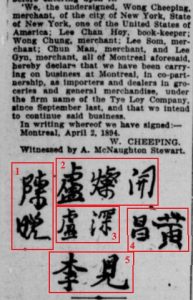Mr. Wong Cheeping: Business Man, Community Member, Transnational Figure, By Amanda Law

Figure 1: Tye Loy Company business agreement signed by Wong Cheeping, Chan Man (Chun Man) [1, top to bottom], Lou Chan Hoy (Lee Chan Hoy) [2, left to right], Lou Sum (Lee Som) [3, left to right], Wong Chun [4, right to left], Lee Jian (Lee Gyn) [5, left to right]; “Like a Laundry Ticket,” Montreal Weekly Witness, 18 Apr. 1894. [1]
Cheeping was not only an established figure in Montreal’s Chinese business landscape, but he was also an active member of the Chinese community in Eastern North America. While he did not have a wife with him in Montreal, he had several local and transnational friends and associates. For example, when Mr. Li Sing, another Chinese merchant, stopped in Montreal on his way to New York after visiting China with his wife in 1895, Cheeping hosted the couple at his residence on Bleury Street for three weeks (“Chinamen with German Wives”). This suggests that Cheeping had an expansive social network that extended well beyond Montreal and Guangzhou (Canton).He had established himself as a merchant in New York City as well, evidenced by his signing the agreement for the Tye Loy Company, as a “merchant of the city of New York” (“Laundry Ticket”). While he learned English and adapted to Canadian manners, which Eaton praises in “Girl Slave in Montreal,” he held on to Chinese customs and traditions, and shared his knowledge with people outside of his community. Continue reading
